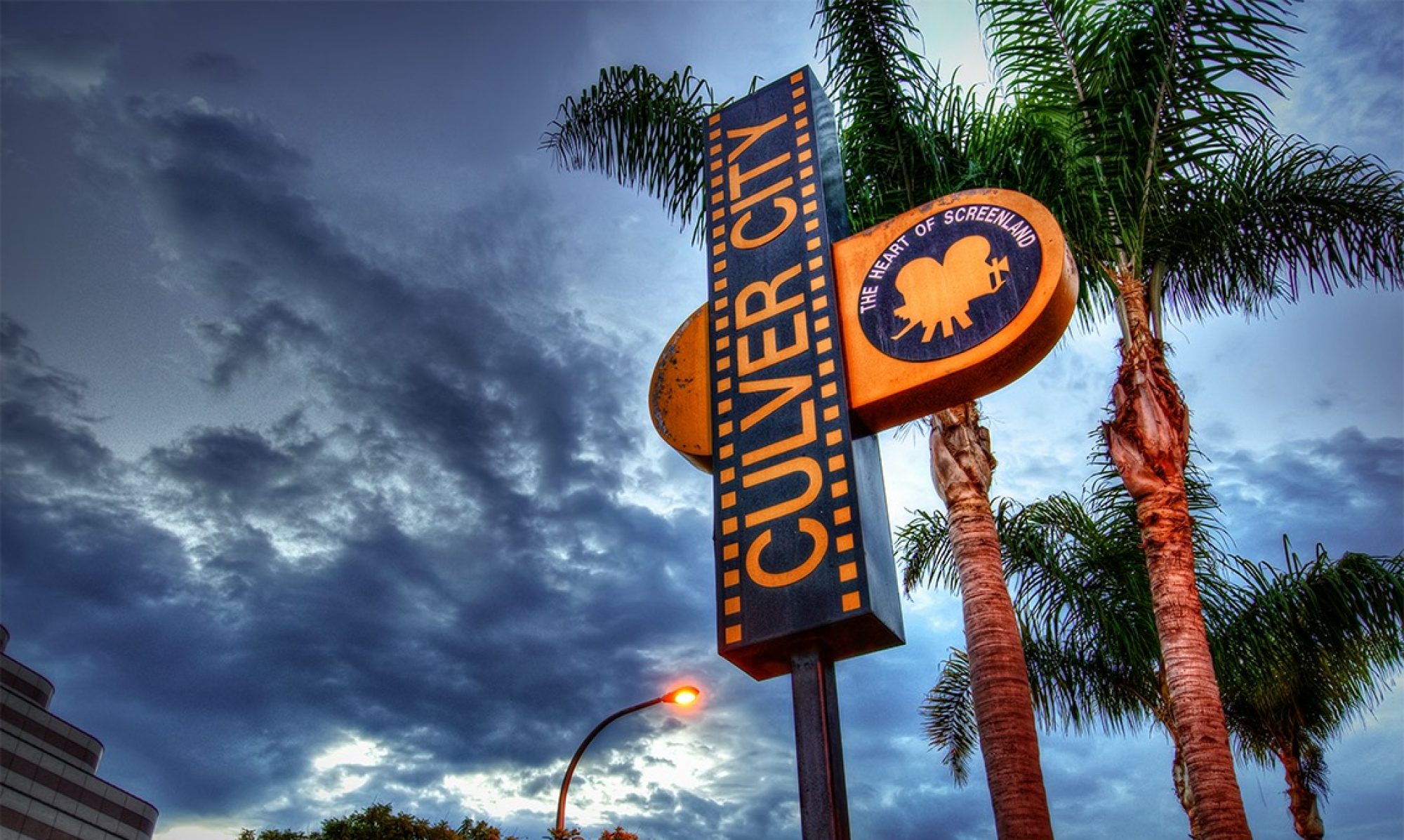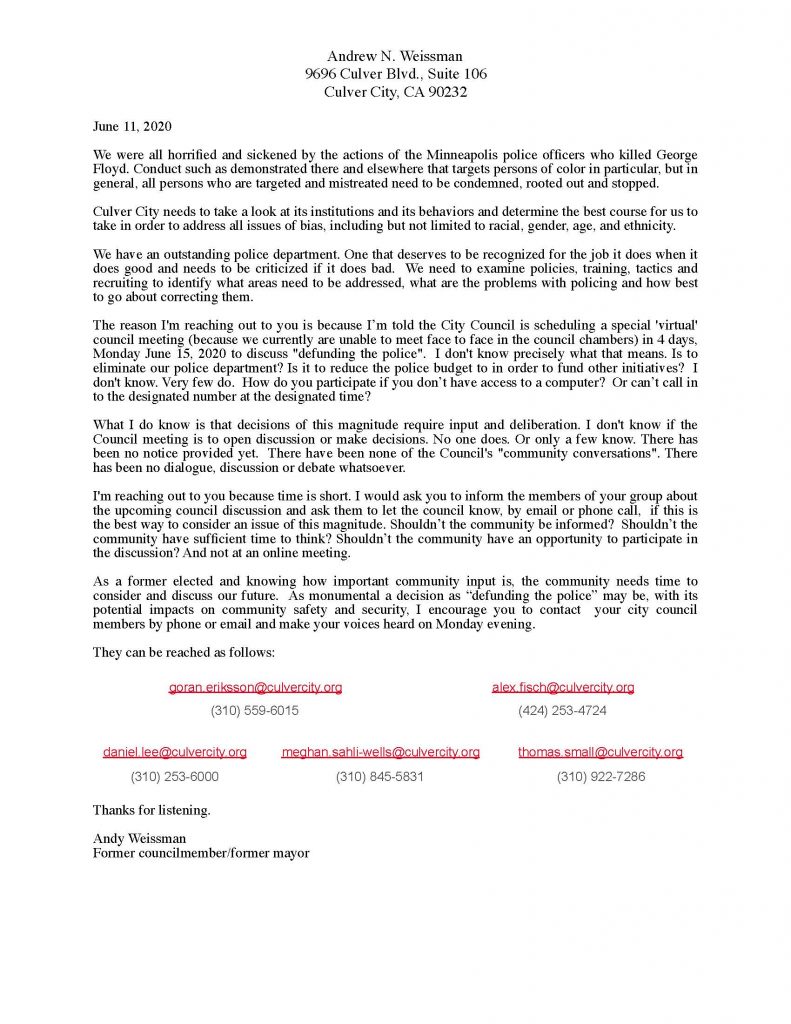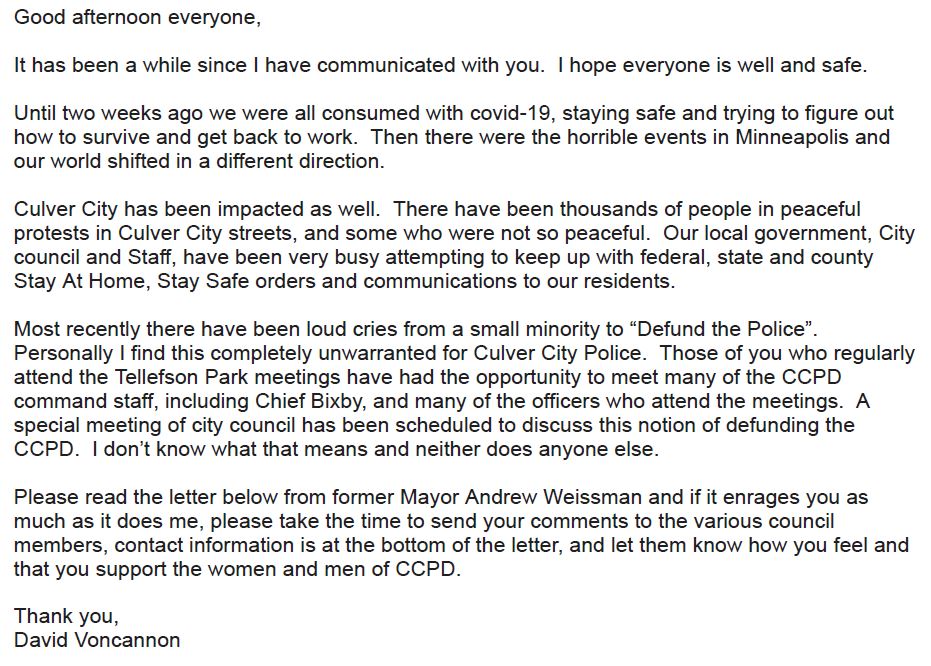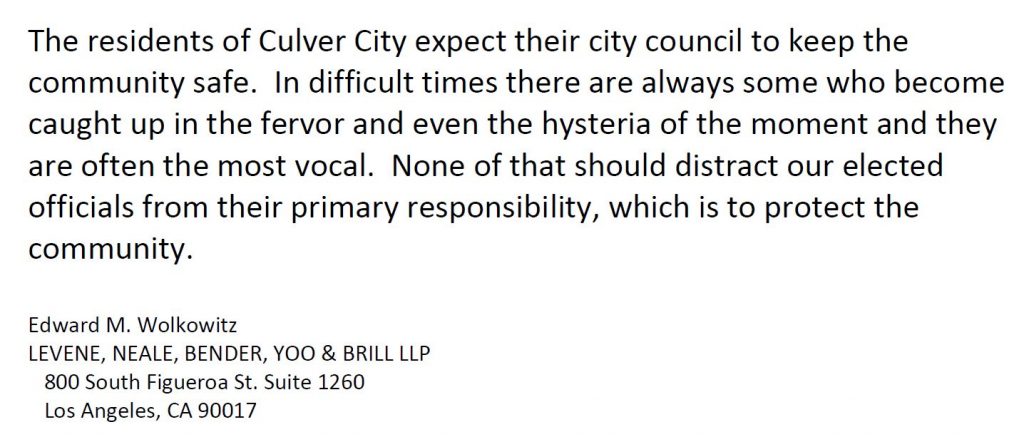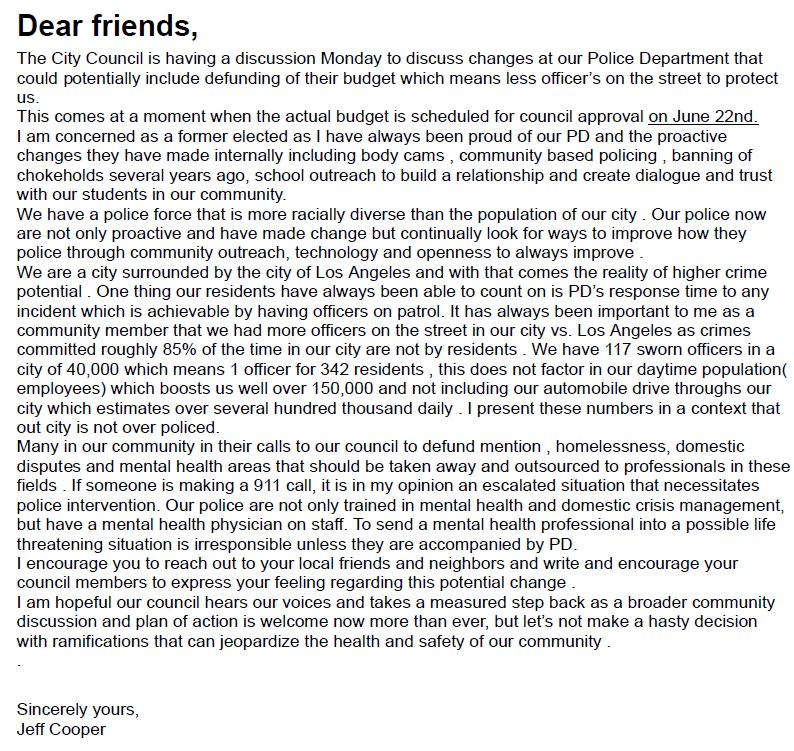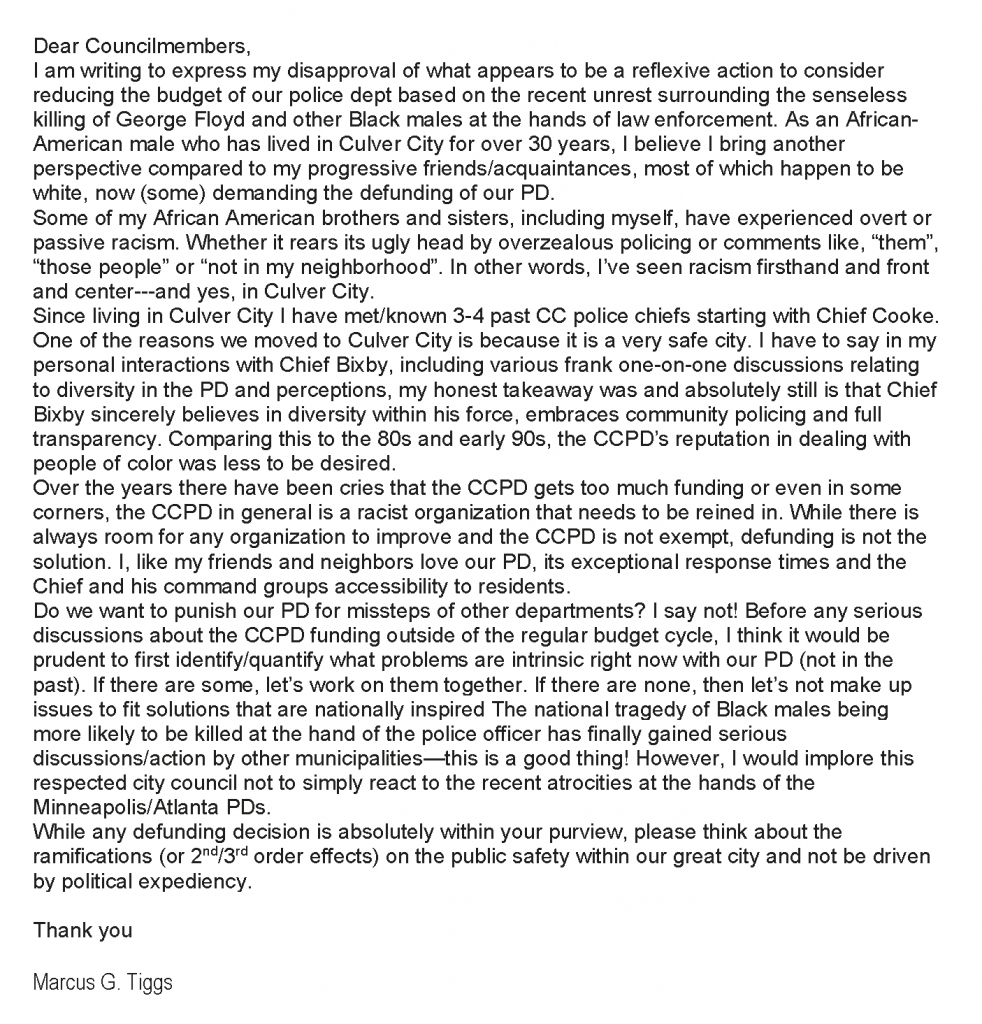2024 will see Protect Culver City’s five year anniversary. We began at 2am June 25th, 2019, after Council implemented rent control. It was how they did it that struck us – in the dead of night, by a Council that never ran on the issue, shutting out all resident input and following verbatim the demands of their militants. Thus we knew that rent control would not be our only or even primary issue.
We had no idea how right we’d be. The following year Culver City saw the worst riots since the Rodney King riots of 1992. Westfield Culver City would have been ransacked were it not for the heroic efforts of the Culver City Police Department. To thank them, this same council that passed rent control pushed to defund them by 50%. That proposal was narrowly defeated after one of their own, Coucnilman Fisch, balked at such a radical move. That began our Defend Don’t Defund campaign, which highlighted Vera and Eriksson’s commitment to CCPD – and the commitment of others to defund it.
Eriksson won re-election by a narrow 32 votes that year. If he had lost to Puza, we would not have a police department as we know it.
Since then we have solidified our commitment to the city to inform residents on several issues that should be dealbreakers for any candidate – but unfortunately are not anymore:
- Culver City should have a police department that enforces laws. This is not a debate about what the budget should be, or what functions should be offloaded, but whether we have a functional police department. Defunding 50% would cease their function as crime prevention and demote them to crime reporting.
- Our city has the right to clean up transient camps. If we have a place to send transients, but they don’t want to go, we have the authority to compel them to move.
- The city is growing and getting denser. But we should not sacrifice the quality of our neighborhoods to get there. Likewise, densification requires public space -and in turn, public safety.
- We believe in the laws of physics and economics. “Build more housing” does not summon builder elves. We need economic policies that pencil out and work at the scale that we need – NOT blank checks to developers. Likewise, naturally occurring affordable housing – i.e., Mom and Pop multifamily – should be supported, not penalized.
- We push for such transparency and accountability in all the city’s finances, including the school board.
- We need traffic policies that reflect the reality of commuting in Los Angeles.
These issues should be dealbreakers – but unfortunately, they are not anymore. “Our Culver”, the latest activist organization in Culver City, advertised their initial meeting “Fund This!” at Veterans Park in April. They made their intentions clear. They see this as their Culver City, not everybody’s. “Fund This!”, as Councilman O’Brien has pointed out, is an allusion to defunding the police – reviving their 2020 demands. They try to soften the rhetoric for election season, by claiming they’re just diverting some funds to other programs like parks. But they are otherwise quite clear about their intentions.
Their tactics don’t stop here. The MOVE lane closures downtown were enormously unpopular and helped swing the city council from 3-2 for it to 3-2 against it. But rather than concede defeat, they preferred to file a frivolous lawsuit against the city to delay restoring the lanes. One of the plaintiffs, Bubba Fish, is running for Council this year with activist support. Regarding the rent registry doxing, they filed a complaint against Albert Vera, which is delaying council from discussing it as well.
These tactics show they consider this their city, and they do not wish to share it democratically.
And while they did not stop the new Council from cleaning up the camps at the Senior Center and Venice/405, it took the new Council to get this done. If they take back the majority, the camps will come back. Their philosophy is anathema to ours: we can build transients the Taj Mahal – if they don’t want to move, we can’t make them. Compelling them to move, they claim, “causes harm.”
With basic livability issues like these at stake this election, you’d think electing sympathetic councilmembers would be a slam dunk. Yet even with all the new moderate political organizations sprouting up in Culver City, the outcome of this election is not secure.
This is because when it comes to elections, the activists don’t run on the issues. At Protect Culver City, we know this all too well. If they advertised themselves as the candidates to shut down CCPD, shut down key car lanes, or allow tent cities, they would lose. Instead, they come up with wild stories about Hackman buying out council. Or smearing anyone who dares run against them.
Just Google our name, Protect Culver City, and you’ll see any number of hitpieces about us. You’d think Hackman paid hundreds of thousands to import tiki torch donning Nazis into Culver City to smash the hopes and dreams of some innocent hippies. It sounds like madness, but these articles get wide distribution through and outside our fair city, though activists on social media. These hitpieces take their tolls. They reach well meaning voters, who then second guess their support for candidates we support. It chills the election environment, and prevents our supporters from campaigning openly and effectively. Meanwhile, these activists proudly strut around their support for their own candidates.
We anticipated these tactics. When we first formed to push back on the rent control conversation, we predicted that Council would not pay attention to us unless we forced them to. Our ballot measure did that. But rather than discuss rent control, they wrote hit pieces about us as some dangerous right wing threat.
From our police department, to zoning, to dealing with transient camps, they kept these same tactics.
Today we remain the only PAC in Culver City to have forced them to campaign against us. Which is why we’ve borne the brunt of their attacks. Other candidates thought they could just run on the issues and get slam-dunk support from voters. They quickly saw their names dragged through the mud. Thus learning the hard lesson that these are not neutral issues – one must stand up and fight for them.
But the city is adjusting. Several other PACs have formed to push back against the progressive slate, as well as candidates championing them. For better or worse, Culver City now has party politics. It doesn’t translate to Democrat/Republican – the above issues enjoy wide bipartisan support – rather, it acknowledges that an individual candidate can no longer win on their own. They need the support of these PACs and their members, who are ready to mobilize.
We already know who the progressives have picked to represent them – Yasmine McMorrin, Bubba Fish, and Nancy Barba. The loose coalition of PACs opposing them are supporting Albert Vera, Denice Renteria, and Jeannine Wisnosky Stehlin. These latter three have the thankless job of remaining above the fray of mudslinging while championing the causes we do.
So how do we support them? By sticking to the issues. We cannot react in kind to the tactics of these activists. We do not name-call, nor are we simply here to resist their agenda. We have to put forth our own vision for the city, our stance on the issues, and where the candidates stand on these issues. And we have to remind 29,000 Culver City voters what those issues are, and where the candidates stand.
Again, these seem like slam dunk issues. But we can fully expect these activists to muddy the water and make the election about anything but these issues. We need to campaign on these issues, loud and clear, to 29,000 voters. We need mailer campaigns, door knockers and phone bankers of our own. Our members need to have the tools to reach out to their neighbors and discuss these issues that essentially separate Vera, Renteria, and Wisnosky-Stehlin from Imani-McMorrin, Fish and Barba.
When voters are aware of these issues, vote on these issues, and ignore the noise and the mudslinging, we win. We all win.
